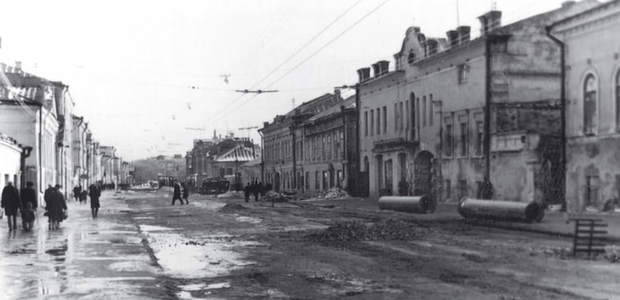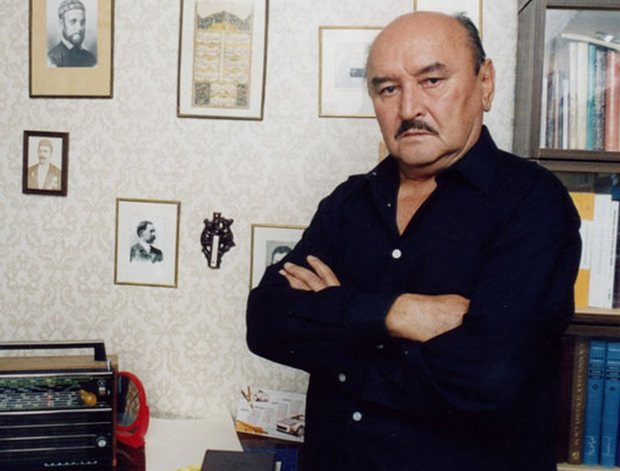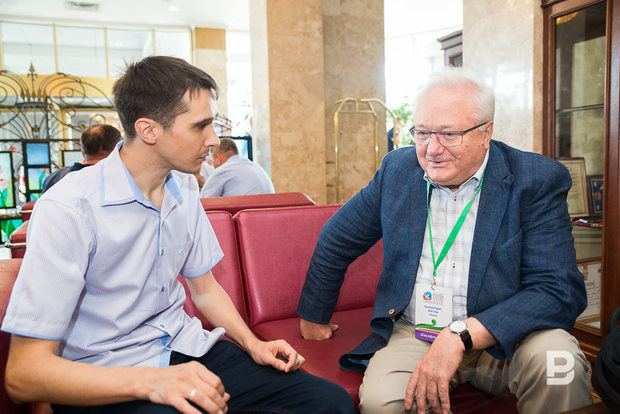Rashid Syunyaev: ''Noticeable part of the changes in Tatarstan are a result of the agreement''
Interview with the famous Soviet and Russian astrophysicist. Part 3. About the new twist of the scientific progress, favourite articles of Realnoe Vremya and ‘‘Russian Indians’’
We are going to witness the next scientific revolution in the short run, famous scientist and astrophysicist Rashid Syunyaev who recently arrived in Kazan believes. In today's (and final) part of the interview to Realnoe Vremya's reporter, the academic told what the new scientific revolution would start with, supported the prolongation of the agreement between Tatarstan and the federal centre and shared his opinion about Wikipedia in languages of Russian peoples. At the end of the talk, the professor admitted what articles he read in our online newspaper more often.
''Companies prepare the next technical revolution''
Mr Syunyaev, it seems that astrophysics is not the only science that interests you, right?
When I was at school, computers were a rare thing even in leading laboratories of the world where they occupied huge space: now they are present in almost every house and on every table in any office. Who could thought in those years when I was standing in queues in the Central Telegraph of Moscow to call my parents to Tashkent that my wife would regularly talk to her daughters-in-law via Skype now for free (!) and see her granddaughters at a distance of hundreds and thousands of kilometres. Science and technological progress make miracles in front of our eyes.
I am invited for dinner together with the Board of Trustees of the Institute for Advanced Study in Princeton from time to time. At the end of dinner, some of the trustees delivers a speech that was prepared beforehand. This May I had a chance to listen to very Eric Schmidt, former Google CEO and today's one of the officials of Alphabet managing company, Google is in its empire. The report was very interesting: Schmidt told the world needed to get ready: the necessity for a big number of existing professions today would disappear in the next 20 or 30 years in leading countries of the world, computers and robots would substitute people. Many people would need retraining. And this process will be inevitable. There was a discussion about what professions would disappear first, what would live longer, how new professions would look.
It was interesting to listen that scientists, researchers would anyway be needed for long. We remembered Luddites, people who were divested of work by first steam engines in England in the first quarter of the 19 th century. Luddites crashed and broke these engines. Human kind overcame several such technical revolutions and still lives.
It was clear that Alphabet and other companies whose names are on the A-list work a lot and prepare the next technical revolution that will strongly affect human kind's life and our lifestyle.

''Schmidt told the world needed to get ready: the necessity for a big number of existing professions today would disappear in the next 20 or 30 years in leading countries of the world, computers and robots would substitute people. Many people would need retraining. And this process will be inevitable.'' Photo: bbc.com
Gradual introduction of cities of unmanned cars is likely to be the first step in this direction for everybody. There is an impression that little time left until big grandiose changes.
''The agreement gave the republic's population more power''
Questions of the agreement with Moscow were raised at the World Congress of the Tatars. What is your opinion?
I am not a politician and historian. It is not easy for me to answer such a question. I will express my point of view. What is my attitude to this issue? I am Tatar. I came to Kazan first in 1962 when I was a second-year student of the Moscow Institute of Physics and Technology. We went to Nizhny Novgorod first, then we came to Kazan with my friend Vitya Sychev. The Komsomol Committee of the Kazan University accommodated us in the hall of residence on Krasnaya Pozitsiya Street. My father asked me to bow to Tukay's grave. I was in the cemetery and walked across a big part of the city on foot.
I have never worked and lived in Kazan. But I knew when I was a kid that Kazan is our capital, the capital of the Tatars. Kazan has changed a lot within 55 years since I was there for the first time. It became a beautiful and well-groomed city that one wants to come to again and again.
It was a poor industrial city 55 years ago. My remote relatives lived not far from the centre. But I saw few places with so many barracks, leaned wooden houses whose windows were under ground, there was not a sewerage system… I remember how amazed I was when I was in Baku several years later where the picture was completely different. The answer was simple – ''We produce oil!'' Now we all know that much more oil has been extracted from Tatarstan fields than that of Azerbaijan. But Tatarstan was not an allied republic, it got little. Everyone understands that a noticeable part of the changes in the republic are mainly a result of the agreement that was signed when the great country where we all lived dissolved, and Russia put more efforts to stop the parade of sovereignties. The agreement gave the republic's population more power. And, as a result, we see Kazan's blossom, a noticeable economic activity across Tatarstan.

''My remote relatives lived not far from the centre. But I saw few places with so many barracks, leaned wooden houses whose windows were under ground, there was not a sewerage system…'' Photo courtesy of Kazan-66 album. Place and Time
''The delay level of Wikipedia in the Tatar language is obvious''
Do Tatars need their own Wikipedia in their mother tongue that you said about earlier?
During one of our meetings with Mirkasym Usmanov, we talked about Wikipedia for a long time – a wonderful encyclopaedia on the Internet that is available in all the living (295!) and actively used languages including Tatar (now there 72,000 articles on it), Chechnya (164,000) and Russian (1,413,000 articles) and English (over 5,457,000).
I said to Mirkasym during the meeting that I often saw American postdoctoral fellows in the institute near Munich immediately use their iPhones, find a corresponding article on Wikipedia and check the discussed numbers or explanation of the meaning of some concept. I myself usually look every article that interests me in three languages: Russian, English and German, sometimes I look Uzbek or Turkish Wikipedia. It is surprising how different the same historical events or histories of great discoveries are told in different languages.
The communication with Wikipedia made me realise that I read in Russian twice faster than in English and four times faster than in German, though in my professional life I have to read and write in English much often than in Russian.
A very serious attitude to the problem of Wikipedia in the Tatar language, financial support and state approach are needed so that kids studying at Tatar schools will have their own encyclopaedia on the Internet where they could know the modern state of affairs in any topic – from history to mathematics, economics, medicine, politics, agronomy and mechanical engineering. And competent people who know their language well but, most importantly, the subject they write about need to be the authors of these articles. Young people, students, specialists and pensioners need to have a possibility to understand the modern level of science and technologies in any sphere in their native language. It will help pass exams, when you don't understand your teacher or when the teacher fell a bit behind the crazy life pace. The delay level of Wikipedia in the Tatar language is obvious: Azerbaijani Wikipedia (123,200 articles), not to mention the Uzbek (129,000), Kazakh (219,400) or Turkish (296,500), is seriously ahead of it. Chuvash (40,500) and Bashkir (39,500) Wikipedia fall just a bit behind. I look through Wikipedia articles in Tatar in the topic where I am considered professional. Unfortunately, the level of many articles leaves a lot to be desired, many of them are very short. These articles lose to articles of English and Russian-speaking Wikipedia because now Wikipedia seems to allow direct translation of the best articles from other languages.

During one of our meetings with Mirkasym Usmanov, we talked about Wikipedia for a long time – a wonderful encyclopaedia on the Internet that is available in all the living (295!) and actively used languages including Tatar
But 72,000 articles (not so many in the beginning) need to be written, much time needs to be spent on editing, checking mentioned facts. And this job is almost paid, usually, enthusiasts do it. Many thanks to them for being.
It is clear that we need to cover questions of Tatar history, Tatarstan's life, write articles about achievements of the republic, its contribution to Russia's development, about villages of the Tatar diaspora, about people we are proud of, and not only on Wikipedia in Tatar but also Russian and English-speaking Wikipedia. People from the diaspora, specialists who know both their specialty and language well need to be attracted, and their labour needs to be even partially paid. It will help the Russian-speaking part of the population and Tatar diaspora know about their people more, hold part of people from complete cultural assimilation. We need to follow the example of the people spread across the world but who managed to conserve their national identity – let's remember Chinese diasporas who speak their own dialects or forgot them or Irish people who have almost completely lost their language but managed to save the strongest love for their homeland, which is often far.
I remember a report that astonished me at a meeting of the American Philosophical Society. A sociology professor at the University of Princeton told about a survey that was held by students in the poorest districts of Los Angeles that were inhabited by recent immigrants. The survey showed that teenagers in the families where parents spoke to their kids in their mother tongue were in criminal bands less often than in the families where parents tried to speak to their kids in their broken and quite limited English. It turned out that children benefit when their parents speak to them in their mother tongue that they know perfectly. In addition, parents can explain and tell in a more reasonable and interesting way. It raises the parents' authority in the eyes of the kids. The meaning and role of their advice also increase.
The second conclusion was also interesting: one should not worry about knowing English; the pressure of the environment and influence of schools is so high that kids in a normal family will anyway speak English fluently.
Thank you for answering our questions.
I would like to add that I often look through Realnoe Vremya with interest. You write about history and ethnography, and I look through these materials with pleasure – Rafael Khakimov, Yaroslav Pilipchuk and other authors. I remember I saw Yaroslav Pilipchuk's article if I am not mistaken 7 years ago where there was an interesting comparison that ''The Nogais are steppe Indians of Ukraine and Russia''. Now this comparison is also used by journalists, for instance, Maksim Shevchenko.
10 years ago I was elected an international member of the American Philosophical Society where meetings with a very interesting programme take place twice a year during two days. Excellent reporters who deal with history, politics, different areas of natural science, ecology deliver speeches there. Ex-US President Barack Obama has been chosen a member of the society this April. This society was founded by Thomas Jefferson, George Washington (it is known they were slaveholders in the spirit of that times as well as great Aleksandr Pushkin and Leo Tolstoy), Benjamin Franklin and other ''fathers of the American Constitution''. Very interesting things can be heard there. For instance, Benjamin Franklin was a lasting chairman of the commission that agreed on ''eternal peace'' with six Indian tribes of the State of Pennsylvania whose military power was stronger than that of the state. It is written in his diaries which words of the Indian were certainly made real and which – unknown yet. Serving such a plate proves an end of the serious negotiations, etc. Franklin was a great diplomat. But he was suspended from these negotiations when the State of Pennsylvania became stronger than the Indians. All the Indians were displaced to Oklahoma, they dealt with the regular American army there. It is well known how this story ended.
Ekaterina the Great ordered to send Zaporozhian Cossacks to Kuban after the conquest of Crimea. Before it, today's Krasnodar and Stavropol Krais were completely cleaned by the regular army of the Nogais who were many there. It is an interesting parallel. And it all happened almost at the same time.

''You write about history and ethnography, and I look through these materials with please – Rafael Khakimov, Yaroslav Pilipchuk and other authors.'' Photo: Maksim Platonov
As a 6 th or 7th grader, I was under a very big impression of The Song of Hiawatha of one of the founders of American poetry Henry Longfellow in an amazing translation of Nobel Prize laureate Ivan Bunin. During those years, extracts from this poem were in the holiday reading programme. The respect and even love for customs, closeness to nature, nobleness of the Indians this poem was written with are surprising. Fenimore Cooper's books about Indians was available in Tashkent bookshops in the 50s: The Last of the Mohicans, The Pathfinder, The Deerslayer…
It is interesting why great Russian literature did not create anything similar about the peoples who inhabited open spaces of the biggest part of Russia until Russians came. Of course, Leo Tolstoy's The Prisoner of the Caucasus and Lermontov's Princess Mary come to my mind. There are Polovtsian Dances from Aleksandr Borodin's opera, Pavel Melnikov-Pechersky's Essays of the Mordvas, Vladimir Arsenyev's Dersu Uzala and Pyotr Yershov's Suzge. The Siberian Legend (who gave us The Humpbacked Horse). But I can't recall anything compared to The Song of Hiawatha.
It is interesting to read historical articles and books, listen to experts' reports. Publications of the Mardjani Institute of History play a huge role. In addition, many of them are available now on the Internet.
Yes, I have almost forgotten. I thank your newspaper for rare but quite regular publications of brief articles in the Tatar language. It is also interesting to read them, and they are written in a beautiful, not very complicated language.
See also:
Part 1: Rashid Syunyaev: ''I do not believe in a cosmic catastrophe in the near future…''
Part 2: Rashid Syunyaev: ''Intelligent life can exist somewhere in our galaxy''